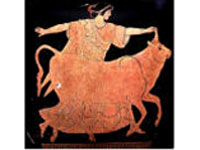|
||||||||||||||||||||||||||
| Archaeology - ARCYA23428 | ||||||||||||||||||||||||||
This plan is only available to students commencing from 2009 onwards
Archaeology is a gateway to the past. Archaeology uses the results of empirical research to study the material culture from the evolution of human beings through contemporary post-industrial industrial societies. The Minor employs and integrates allied disciplines through the theories, methods and practices of archaeology, affirming that archaeology constitutes a nexus of disciplines employed to understand the human past in all its scope and diversity. The Minor is relentlessly multidisciplinary. It incorporates courses from biological and sociocultural anthropology, history, history and philosophy of science, and the natural sciences. Although it respects the methodological approaches of individual disciplines and the advances they have yielded, it will require students to employ multiple disciplines in their exploration of the changing human condition. In the process it prepares and encourages students to actively participate in the practice of archaeology. Students minoring in Archaeology will follow a progressive and multidisciplinary course of study, taking classes in archaeological theories, methods and practices, plus courses in at least one of the following three disciplines: 1. Physical or biological anthropology 2. Social or cultural anthropology 3. An allied natural or social science such as: • Biological Science • Environmental Science • Geoscience • History • History and Philosophy of Science Archaeology, as the source of material evidence about the past and an approach to its interpretation, unifies the Minor, integrating diverse approaches to address major themes in the study of the human past – physical and cultural evolution, human interaction across cultures, and human interaction with the environment. AIMS OF THE MINOR The study of archaeology in a multidisciplinary context develops in its students a range of skills, abilities and qualities of mind. These are generically useful, but also specific to archaeology and related disciplines in the natural and social sciences. This Minor places particular emphasis on the intersections of the disciplines germane to archaeology. Archaeology develops ways of thinking drawn from its constituent disciplines and applied to the study of the human past, but ones that are transferable into a range of career paths. The ultimate aim of a Minor in interdisciplinary archaeology is to help develop broadly informed graduates who are critical, reflective and creative. Specifically, a Minor in interdisciplinary archaeology seeks to: • Challenge students to engage fundamental questions about the nature and evolution of human beings and human societies. • Challenge students to engage fundamental questions about interactions between humans and nature, and among humans themselves. • Equip students with a range of related and complementary disciplinary frameworks that may be brought to bear on these general questions, and cultivate an ability to choose amongst or combine disciplinary approaches when addressing specific questions and problems. • Instill in students an appreciation of the diachronic and synchronic diversity of humanity, thus providing students with the ability to analyse and situate themselves as individuals, as members of a particular society, culture, or nation, and as human beings. • Introduce students to theoretically informed empirical research in the form of participation in original fieldwork and critical evaluation of others’ fieldwork. A student who wishes to gain a Minor in Archaeology must complete 36 units of credit including 6 uoc at Level 1, at least 12 uoc at Level 2 and at least 12 uoc at Level 3.
Level 1
At Level 1 students will enrol in the Archaeology gateway course:
In order to meet the prerequisites of some Level 2 and Level 3 courses in Archaeology, students may consider undertaking one further elective from the following list:
Level 2
Core Course in Archaeology:
The following courses from other subject areas can also be counted towards the Archaeology Minor:
Level 3
At Level 3 students may choose from electives courses in archaeology or allied natural and social sciences, including:
• Advanced topics in Archaeology • Biological Anthropology • Sociocultural Anthropology • Cultural Heritage Management • Biological Sciences • Geological Sciences • Geographic Information Systems • History • History and Philosophy of Science Level 3 course vary between disciplines, but often entail focused, advanced work that builds upon understanding gained at Level 2. The complete list of Level 3 Courses in Archaeology will be published in the 2011 Handbook. However, the following courses from other subject areas have prerequisites:
|
||||||||||||||||||||||||||



